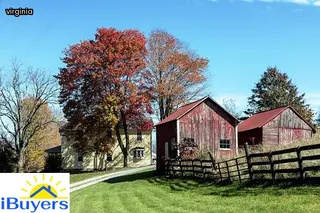Navigating the probate process in Virginia can be a daunting task for those inheriting real estate. It is important to understand the steps of the process in order to ensure that everything is done correctly and efficiently.
In Virginia, all estates must go through probate regardless of whether there is a will or not. The court appoints an executor who is responsible for ensuring that all assets are properly distributed and all debts are paid.
The executor must also submit an inventory of assets to the court and pay any applicable taxes or fees. Real estate may have to be appraised before being distributed, which can add more time to the process.
Creditors must be notified through an advertisement in a newspaper and given a certain amount of time to make claims against the estate before it can be closed. All heirs must sign off on any documents before they are submitted by the executor, which requires cooperation between family members.
It's important for those going through this process to know their rights as well as potential tax implications when it comes to inheritance in Virginia so that they don't end up paying more than necessary.

A probate lawyer is essential to successfully and efficiently navigate the Virginia probate process for real estate inheritance. They can provide valuable guidance and resources throughout the entire process, from determining the value of the estate to helping with asset distribution among beneficiaries.
A probate lawyer can also help ensure that all legal documents are properly filed and all necessary deadlines are met. When dealing with a complex real estate inheritance, hiring an experienced attorney can alleviate any unnecessary stress or confusion.
A good probate lawyer will have a thorough understanding of Virginia's laws concerning wills and trusts and be able to provide sound legal advice specific to your case. Additionally, they can identify potential issues such as creditor claims or other challenges that may arise during the process.
Overall, having a knowledgeable lawyer by your side throughout the Virginia probate process for real estate inheritance increases your chances of achieving a successful outcome.
When navigating the Virginia probate process for real estate inheritance, selecting an executor is a crucial step. It is important to choose someone who is both capable and trustworthy.
In Virginia, the court may appoint an administrator if the deceased did not name an executor in their will or if the named executor declines to serve. The court will usually appoint someone who has a close relationship with the deceased, such as a spouse or adult children.
However, it is also possible to nominate a professional fiduciary or financial institution to handle these duties. When selecting an executor for an estate in Virginia, consider factors such as their experience managing finances and estates, their relationship with heirs and beneficiaries, and how comfortable you feel entrusting them with this responsibility.
The executor should be familiar with the Virginia probate process and must be willing to serve as a representative of the estate during this time. Ultimately, choosing an executor can be a difficult decision but it is essential for ensuring that all aspects of the probate process are handled properly and efficiently.

In Virginia, an executor has a variety of responsibilities when it comes to navigating the probate process for real estate inheritance. One of the executor's primary duties is to locate and take possession of the deceased individual's assets, including all real estate and personal property.
The executor must then inventory these assets and appraise their value. It is also the responsibility of the executor to pay off any outstanding debts or liabilities owed by the deceased party.
This includes any taxes, medical bills, funeral expenses or other financial obligations. Additionally, it is important that the executor properly distribute all remaining assets according to the provisions in the will or other applicable law.
This may include transferring title to real estate properties or distributing personal belongings such as jewelry and automobiles. Executors are also responsible for ensuring that all legal requirements related to probate are met and that any necessary paperwork is filed with the court in a timely manner.
Finally, if there are disputes between heirs over inheritance rights, it is up to the executor to resolve them in accordance with Virginia law.
The Virginia probate process for real estate inheritance can be overwhelming, but with a clear understanding of the necessary procedures, settling an estate through probate can be much simpler. In Virginia, the court-supervised probate process is required when someone dies and leaves a will or has assets in their name alone.
The executor or personal representative of the estate is responsible for collecting all assets, paying any outstanding debts and taxes, and distributing the remaining assets according to the instructions in the will or under applicable state law. To begin this process, it is important to locate and provide copies of the decedent’s original will and death certificate to the appropriate Circuit Court Clerk’s office in Virginia.
The clerk of court then issues Letters Testamentary which appoints the executor as legal representative of the estate. From there, creditors are notified so that debts may be paid from the estate funds, appraisals are made for any real property owned by the decedent, and taxes must be paid prior to distribution.
After all liabilities have been addressed, beneficiaries identified in or outside of a will may receive their share of any remaining assets. Finally, closure on an estate matters is achieved when an administrator files a final accounting with relevant court documents.
Navigating these steps involved in settling an estate via Virginia probate can seem daunting, but by keeping these procedures in mind it can be done efficiently within a reasonable timeframe.

Navigating the probate process in Virginia can be a complex and time-consuming task, especially when it concerns inheriting real estate. In some cases, you may be wondering if you can sell a house during this process.
The short answer is yes, but there are several steps and considerations to keep in mind before doing so. First, the executor of the estate must obtain court approval to sell the property.
This requires filing a petition with the court along with any necessary supporting documents such as an inventory of assets or appraisals. If approved, the executor must then identify potential buyers, negotiate terms of sale and prepare closing documents for review by all parties involved.
It is important to note that any proceeds from a sale must go towards paying creditors or taxes due on the estate before being distributed to beneficiaries as required by law. Additionally, real estate agents may need to obtain special certification if they are representing an estate in a transaction involving inherited property.
Navigating the Virginia probate process for real estate inheritance is a complicated and often cumbersome task. Understanding whether or not to go through the probate process when selling a house in Virginia is essential to properly transferring title of the property.
In some situations, a court-supervised probate case may be necessary to ensure that all legal requirements are met, while other times it may be unnecessary. It is important to consult with an attorney experienced in Virginia's probate law to determine the best course of action when selling a house due to inheritance.
Certain facts about the property and the deceased's will must be taken into consideration before filing probate paperwork, such as if there are any debts or liens against the property, who was named as beneficiaries in the will, and if there are any disputes among family members concerning ownership of the house. Knowing how to handle inheritance taxes, expenses paid from estate funds and all other costs associated with selling a home in Virginia can help make sure that everything is done properly and efficiently throughout the entire process.

In Virginia, probate is the process through which a deceased person's assets are transferred to their beneficiaries. This can be a lengthy and expensive process, particularly if it involves real estate inheritance.
Fortunately, there are a few strategies that can be employed to minimize or avoid probate in Virginia. One of the most common is for the decedent to create a trust fund prior to death and transfer ownership of any real estate into this trust.
A revocable living trust allows for greater control of how assets are distributed after death and is also exempt from probate in Virginia. Additionally, beneficiaries may be able to use beneficiary deeds or Transfer on Death (TOD) deeds as another way of avoiding probate.
These instruments allow the person to designate who will receive the real estate after they die without having to go through the probate process. Finally, jointly owned property may pass directly to another person without going through probate if one owner dies or if all owners agree beforehand to transfer it outside of probate court proceedings.
Though each case is different, these strategies can help reduce costs, time and hassle by minimizing or avoiding Virginia's probate process when dealing with real estate inheritance.
Navigating the probate process in Virginia can be a complex and time consuming task. It is important to understand that there may be costs associated with finalizing an estate through probate, and these costs can vary depending on the size and complexity of an estate.
Generally, the more assets involved in an estate, the more likely it is that you will need to pay some fees. The executor of the estate is typically responsible for any necessary filing fees or court costs.
In addition, if the estate requires a professional appraisal or other services, those fees could also add up. Furthermore, when preparing documents for probate court, it might be necessary to hire an attorney who will charge a fee for their services.
Ultimately, there may be some financial burden associated with settling an inheritance in Virginia through probate court but understanding all the potential fees upfront can help minimize surprises during this difficult process.

An executor of a Virginia estate is entitled to receive reasonable compensation for their services in administering the estate. In Virginia, the amount of compensation an executor can claim is determined by the value of the estate.
If the value of the estate is less than $50,000, then they are generally limited to a maximum fee of 5% of the gross value of the estate. For estates valued over $50,000 but under $500,000 they are allowed to claim up to 4% of the gross value.
Estates valued at more than $500,000 may be set with a 3% commission rate. Furthermore, extra compensation may also be awarded in certain circumstances if approved by a judge in a probate court.
Executors should keep meticulous records and receipts for all expenses incurred in administering an estate as well as any additional fees claimed for their service so that these can be presented for review before any payment is made.
Navigating the Virginia probate process for real estate inheritance can seem daunting and lengthy. Depending on the complexity of the estate, it usually takes between six months to a year to complete the probate process in Virginia.
The time frame begins when the court assigns an executor or administrator and ends when they distribute assets to heirs. Some of the steps during this period include filing a will with the court if one exists, identifying and appraising assets, paying debts and taxes, notifying heirs of their interests, settling disputes and distributing remaining assets.
If all paperwork is filed accurately, creditors are paid and no legal challenges arise then the estate can be administered more quickly than usual. It is important to keep in mind that each case is unique so it is best to consult a lawyer who specializes in probate law in order to understand what is involved in navigating Virginia's probate process for real estate inheritance.
Yes, real estate in Virginia does go through the probate process. In Virginia, when a person dies, their assets must be distributed according to either a will or in accordance with the state’s laws of intestacy.
To ensure that the deceased’s wishes are respected and all debts are paid, all assets must pass through probate. This includes real estate, such as houses and land.
The probate process can be complicated and lengthy, but it is necessary to ensure that the property is distributed properly and efficiently. An experienced attorney can help guide executors through the probate process in Virginia and make sure that all steps are taken correctly so that inheritance of real estate is properly handled for all parties involved.

One way to avoid probate on real estate in Virginia is to establish a living trust. If specific assets are held in the trust, they will not have to go through the probate process upon death.
In addition, if an individual sets up a transfer-on-death deed or beneficiary deed, they can specify who they would like their real estate properties to go to without having to go through probate. Another option is joint tenancy with right of survivorship which allows two or more people to own a property together and when one dies, the other person will automatically be granted ownership of that asset.
Lastly, it’s important for individuals in Virginia to set up wills so that all of their assets can be handled quickly and efficiently according to their wishes and without going through probate court.
Navigating the Virginia probate process for real estate inheritance can bring about many questions, especially for those who wish to sell a house while in probate. In Virginia, it is possible to sell a house while in probate, though there are some restrictions which must be taken into consideration.
First and foremost, the executor of the estate must be approved by the court to handle all distribution of assets from the estate. This includes any potential sale of real estate.
The executor will also need to obtain a “grant of authority” from the probate court in order to move forward with any sale. Additionally, depending on whether or not there are debts associated with the estate, creditors may need to be paid before a sale can take place.
Once these steps have been taken and all parties involved agree on terms related to the sale, then you can move forward with putting your house up for sale while in probate.
In Virginia, certain assets are exempt from probate when it comes to real estate inheritance.
Assets that do not need to go through the probate process in Virginia include joint tenancy assets, life insurance proceeds, certain retirement accounts such as IRAs and 401(k)s, and assets held in a revocable living trust.
Additionally, property that is valued at $50,000 or less can be transferred without having to go through the probate process.
It's important for individuals navigating the Virginia probate process for real estate inheritance to be aware of what assets are exempt from probate in order to avoid unnecessary delays and costs.